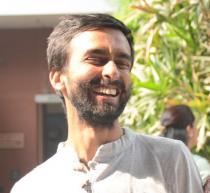To comment or receive more such wisdom, please register on www.gyanalogy.com/login

Scene 1
A common sight at 1 AM at my office floor, where me (a high performing associate), a pre-MBA analyst and a Vice President with an empathetic bent (and not to forget an eagerness to get promoted to Director) are sitting, trying to work our way through Nth round of edits to a slide-deck, for a multi-million dollar deal meeting the next day. The VP needs a break and starts playing “Der Lagi Lekin, Maine ab hi Jeena Seekh Liya..” (It took me time, but I have figured out now how to live).
The song brings much needed moments of relief to all of us, where we can forget about our scripts for tomorrow and just soak in. It allows us a moment to tap into our human-ness, our unsaid yearnings and our acceptance of our fate tonight. Poetry and music can help us forget our repressed sorrows and be free (remember ShawshankRedemption mid-day Opera?). I also laugh on the inside, at the absurdity of the scene - at 1 AM in the office we are making slides and asking “maine jeena seekh liya”. 🙂
Scene 2
Internet is the hottest investment sector, fortunes are being made overnight. And we are the kingmakers. Its the bonus day. We had a great year. It's my turn to collect my bonus letter. I go to the meeting room, I am handed over the letter, and words of praise again, highest rated associate again. 🙂 I am walking back to my desk, on the way a director calls me and says “Rohit, you know the day we receive bonuses is the saddest day of the year for me”. I am intrigued and slightly amused, I walk closer to him. “Why?” I ask and he says, “Whether it's been a great year, a good year or bad year, whatever I receive, my mind is like, man, you deserved more”. (and it that one was a great year by the way).
That day, it became very clear to me. I don’t want to find myself there 20 years later.
Before that let’s also rewind to 2013-15, when I was studying at IIM Bangalore, one of the top B-schools of the country. Its placement season, and as expected, all of us are trying to stand out during the pre-placement talk by asking questions. One very senior investment banker from a “bulge bracket” firm is delivering a talk and I ask him “You have worked a 25-year long career in banking. What has kept you motivated this long?” He thinks for a few seconds, and then he just throws it out “Money. I would be lying if I said anything else.And there is also the kick of closing big deals, which shape the economy, etc. etc.”.
Anyway, to triangulate from the above incidents, a year or so into my job, few questions started coming to my mind very prominently -
Is more consumption a good answer to wellbeing?
Back in my childhood, we used to just have 2 pairs of shoes - one school shoes and one outside shoe. Now, I used to probably order a pair every month online. Brown, Black, Sneakers, Running, Gym, Trekking, Badminton and more. Still, at every party, I would feel like I am lagging behind.
Back in childhood, a street chaat (Indian snacks) for (INR) 10Rupees could have given a sense of delight. Can I say, that when I eat in choicest 5star restaurants today, happiness is any more?
We often tend to make a mistake of seeing people who can be happy with small things as “naive” or “cute”, but isn’t it a reflection or our own inefficient inner ecology? That we need so much material input, to achieve the same level of happiness?
This dependence on external pleasures, is it preventing us from making a leap to our deeper longings?
Is more income or highly “impactful” work a good answer to wellbeing?
I had spent enough time with the movers and shakers of the corporate and startup world, to clearly observe that more professional name and fame also doesn’t translate into wellbeing. In fact, perhaps the more you get vested in a public identity, more difficult it is to divest from it and allow yourself to see that it is just a label which you have created for yourself.
We all have an overwhelming tendency to feel “relevant”, feel important, etc. But since we haven’t really invested time in looking inside, we don’t know whether it is the voice of the ego or your true-self/inner voice/deeper calling, etc. I had come to really doubt, that selling things could be anyone’s highest aspiration.
The ego wants to feel relevant, be known, feel worthy, but any investment in that direction is a step in the direction of more suffering for yourself and others. So its really important to understand explore your own mind and voices inside. A few days ago, I was speaking to my former boss at Avendus, a dear friend, who also retired at 45, a few months before I left Avendus. He said that many “well-wishers” told him that don’t be inactive for more than 6 months, else you will become “irrelevant”, to which he would reply “oh, what a great blessing it would be, to have become irrelevant, to become insignificant”.
If in Maslow’s hierarchy, if your pursuit of esteem needs were also contributing to your future pursuit of actualization, then it all would be perhaps easier. However, the challenge is, that more we invest in esteem needs, perhaps it is taking us further away from actualization, in which one lives in flow with rest of the universe and that’s when one’s gifts can serendipitously come out in service to the betterment of humanity. Perhaps, in self-actualization, there is no sense of a separate self. So in that sense, its a big risk which faces people like us from premier B-schools, that most of our life we keep working in a way which perhaps keeps on undermining our chance of actualization.
Can there be wholesome livelihood options, which don’t create unintended consequences for society?
One of the biggest questions for me as I started understanding businesses deeply, not only at day-to-day execution level but right up to the CXO and board level, and more importantly the design principles behind driving more and more consumption. Unless I make you consume more, I can’t build a successful business. By my own experience, I had realized that more and more consumption does not contribute to wellbeing, rather perhaps takes us away from the deeper inner sources of wellbeing.
I have been thinking of an example these days, that if you have a kid (or a diabetic parent) at your house, and he is too keen on eating more and more ice-creams today. After they have had a couple, you will certainly not want them to go for a third. You will out of love, try to convince them to not go for a third. However, as a CEO or a management consultant or a banker, you will be delighted more and more as your “Average Revenue per User” goes up and up. You will probably hire a team of marketers and designers to do all that you can, create subliminal, immersive advertisements, perfect instore placements, and the toppings to go with that ice cream to further increase ARPU, consumes more and more. So this shows a fundamental gap in how we behave for people whom we care for, and how our systems operate. Here is Yuval Noah Harari saying that in the age of technology, if you don’t “know thyself”, then you are very vulnerable to being exploited, and here is Founder of Linkedin Reid Hoffman talking about how we knowingly unknowingly tap into human vulnerabilities for economic growth.
Similarly, in this pandemic, we have all felt frustration if our promotions were delayed or bonuses or raises were curtailed, while in the same job we have consulted our clients to manage the bottom line by mass layoffs of blue-collar workers (who need the money much more than we do). This pandemic has also shown us (if it was not very clear already), a systemic tendency to profiteer from suffering.
The challenge with this systemic driving of consumption is (and with tech, its all going to a whole new level and subtler), as Mulla Nasiruddin’s story reminds us is that it is perhaps shining spotlight in the wrong place, where we may not find the keys to our fulfilment.
And as people leading these systems, I think we all feel a need to reflect on how we can collectively work to evolve our systems to create more wholesome possibilities for the future? How can we design our lives and our systems to optimize for “the middle path”, for a wholesome balance?
Let us try exploring it more with a few questions in the next article.
Can we integrate the inner life and the outer life?
 Rohit Rajgarhia is an MBA from IIM Bangalore and a Chartered Accountant. He is intending to curate an online shared space, a 4-week program perhaps, with some nice readings, small practices and reflections, as a gift offering. If you feel interested in contributing to this experiment, please say hi at the same email. I am reachable at [email protected].
Rohit Rajgarhia is an MBA from IIM Bangalore and a Chartered Accountant. He is intending to curate an online shared space, a 4-week program perhaps, with some nice readings, small practices and reflections, as a gift offering. If you feel interested in contributing to this experiment, please say hi at the same email. I am reachable at [email protected].
Thank you for giving your attention and time. If you want to read more, you can also check out this super long blog on my stories here. But more importantly, I am now looking forward to listening to your stories, and if possible find small ways to support each other in this inner and outer discovery.
To comment or receive more such wisdom, please register on www.gyanalogy.com




[…] Previous Article – Experiments in “richness” […]